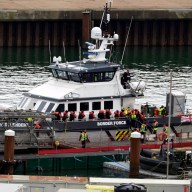OTTAWA – While on his way to the shower at Kandahar’s provincial reconstruction base last month, Lt.-Gen. Michel Gauthier bumped into a worn-out soldier who unloaded on him about Canada’s mission in Afghanistan.
With both of them out of uniform, the soldier spewed out his frustration to the man who retires Monday after leading all of the country’s overseas operations for the last three-and-a-half years.
Gauthier listened quietly.
“He did not have absolutely positive things to say about the tour and was very much looking forward to getting back to Canada after seven-and-a-half months,” recalled Gauthier, who retires after 36 years.
“Of course he didn’t know who I was. He was being a little more frank than he would have been knowing there was a three-star general in his presence.”
The unidentified soldier, a 23-year veteran, drove an ambulance with a quick-reaction force of troops, retrieving wounded comrades and attending the dead before evacuation helicopters arrive. A few weeks earlier, a roadside bomb blast had struck the vehicle in front of him, killed a couple of buddies and left the frustrated soldier wounded.
“After he discovered who I was, he apologized and said he didn’t mean to complain or say bad things about the mission,” said Gauthier, who was on his field visit as commander.
There were no hard feelings.
Gauthier said he reassured him he had earned the right to speak his mind and later presented the master corporal with a commander’s coin, a symbol of a job well done.
Because of his wounds, doctors had offered the man a chance to rotate home, but the driver chose instead to “stay with his buddies until the end” of the tour, Gauthier later learned.
To the man who has been in charge of the country’s largest and most complex overseas operations since the Korean war, the out-of-uniform chance encounter spoke volumes about where the hearts and heads of his soldiers were.
Canadian soldiers, he says, are “intellectually engaged in ways soldiers might not have been in the past because they’re smart people.”
A career soldier and the son of a retired air force general, Gauthier was appointed in 2006 as the first head of Canadian Expeditionary Force Command (CEFCOM), an Ottawa-based headquarters struck as part of the reorganization of the military under former chief of defence staff Gen. Rick Hillier.
Up to 24,000 soldiers, sailors and aircrew have served under him on 15 different missions.
Gauthier will hand over the reins Monday to Lt.-Gen. Marc Lessard and leave behind an unfinished, unpopular war – one that 90 per cent of Canadians in a recent Canadian Press Harris-Decima survey said they wanted out of on schedule in 2011.
He readily conceded his worst days were the ones with the telephone calls reporting the deaths of most of the 118 soldiers.
Reserved and nowhere near as colourful as Hillier or some of his contemporaries, Gauthier, a combat engineer by training, seemed unfazed that Afghanistan could be all that people remember about him.
“I’m more interested in seeing how history judges Canada and how history judges our men and women during my tenure,” he told The Canadian Press in his final interview.
A crystal ball sat on his desk throughout his years at CEFCOM – a gift from a British colleague when Gauthier was still head of Canadian military intelligence.
While resisting the temptation to gaze into it thus far, he said it was premature to judge the war a failure, especially with the watrershed influx of thousands of American troops.
His most searing memory is of the sweltering Labour Day weekend in 2006 as Canadian and NATO troops fought their way through the arid grapefields and mazes of mud-walled compounds in the landmark battle Operation Medusa.
With his ear glued to a secure telephone link, Gauthier counselled ground commanders as the complex, bloody fight unfolded.
There has been debate in military circles about some of Brig.-Gen. David Fraser’s decisions, particularly an assault across the Arghandab River without an artillery bombardment early in the operation.
Gauthier defended Fraser.
“Not once did I feel a need to suggest a single decision he made – and he made them all – was the wrong one.
“He needed to know he had the support of a nation and his Canadian chain of command as he was making history in those very difficult and proud days for Canada.”
















